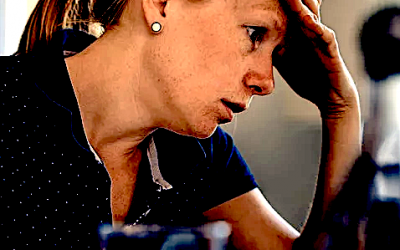Many of us enjoy writing in a diary, reading autobiographies or nostalgically reflecting with others about past times.
Why is remembering our past so important? Are there downsides? And what can we do if dwelling on the past bothers us?
Memories make us human
Over several decades, researchers have shown remembering your past is fundamental to being human, and has four important roles.
1. Memories help form our identity
Our personal memories give us a sense of continuity — the same person (or sense of self) moving through time. They provide important details of who we are and who we would like to be.
2. Memories help us solve problems
Memories offer us potential solutions to current problems and help guide and direct us when solving them.
3. Memories make us social
Personal memories are essential for social interactions. Being able to recall personal memories provides important material when making new friends, forming relationships and maintaining ones we already have.
4. Memories help us regulate our emotions
Our memories provide examples of similar situations we’ve been in before. This allows us to reflect on how we managed that emotion before and what we can learn from that experience.
Such memories can also help us manage strong negative emotions. For example, when someone is feeling sad they can take time to dwell on a positive memory to improve their mood.
Memories help us function in our wider society
Dwelling on our personal memories not only helps us as individuals. It also allows us to operate in our socio-cultural context; society and culture influence the way we remember our past.
For instance, in Western individualistic cultures people tend to recall memories that are long, specific, detailed and focus on the individual.
In contrast, in East Asian cultures people tend to recall more general memories focusing on social interactions and significant others. Researchers have seen these differences in children and adults.
Indeed, the way parents discuss past events with their children differs culturally.
Parents from Western cultures focus more on the child and the child’s thoughts and emotions than East Asian parents. So, there are even cultural differences in the ways we teach our children to dwell on the past.
People from Western individualistic cultures tend to recollect specific unique memories that reaffirm someone’s uniqueness, a value emphasised in Western cultures. In contrast, in East Asian cultures memories function to assist with relatedness and social connection, a value emphasised in East Asian cultures.
Memories and ill health
As dwelling on the past plays such a crucial role in how we function as humans, it is unsurprising that disruptions in how we remember arise in several psychological disorders.
People with depression, for instance, tend to remember more negative personal memories and fewer positive personal memories than those without depression. For example, someone with depression may remember failing an exam rather than remembering their academic successes.
People with depression also have great difficulty remembering something from a specific time and place, for instance “I really enjoyed going to Sam’s party last Thursday”. Instead they provide memories of general experiences, for instance, “I like going to parties”.
We have found people with depression also tend to structure their life story differently and report more negative life stories. They also tend to remember periods of their life, such as going to university, as either distinctly positive or negative (rather than a combination of both).
Disturbances in memory are also the hallmarks of post-traumatic stress disorder. This is when unwanted, distressing personal memories of the trauma spontaneously pop into the mind.
People with anxiety disorders also tend to have biases when remembering their personal past. For instance, all of us, unfortunately, experience social blunders from time to time, such as tripping getting onto a bus or spilling a drink at a party. However, people with social anxiety are more likely to be consumed with feelings of embarrassment and shame when remembering these experiences.
Finally, an excessive, repetitive dwelling on your past, without generating solutions, can be unhelpful. It can result in emotional distress and in extreme instances, emotional disorders, such as depression, anxiety and post-traumatic stress disorder.
I don’t want to dwell on the past. What can I do?
If dwelling on the past bothers you, these practical tips can help.
Set aside a certain time of the day for your memories. You could write in a diary or write down your worries. Writing about important personal experiences in an emotional way for as little as 15 minutes a day can improve your mental and physical health.
Practice remembering specific positive memories from your past. This can allow you to engage differently with your memories and gain a new perspective on your memories.
Learn and practise mindfulness strategies. Instead of dwelling on painful memories, a focus on the present moment (such as attending to your breath, focusing on what you can currently see, smell or hear) can help break a negative cycle
When dwelling on past memories try being proactive and generate ideas to solve problems rather than just being passive.
Senior Lecturer in Clinical Psychology, Monash University
This article first appeared in https://theconversation.com/why-do-i-dwell-on-the-past-121630
Goal Setting: The Key to Personal and Professional Success
The ability to set and achieve goals is more crucial than ever. Whether you're a student, professional, or entrepreneur, understanding the art of goal setting can be the difference between merely dreaming and actually realizing your aspirations. This article delves...
Where Is Society Going with The Top 15 Growth Performers of 2024?
As we analyze these stocks and their sectors, we can infer several key observations about where society may be heading in the near future. These stocks span a wide range of industries, from technology and artificial intelligence to electric vehicles and healthcare,...
Everything to Know Before Buying an Oura Ring
The Oura Ring is a sophisticated health and fitness tracker designed to provide comprehensive insights into various biometric metrics but it has a few bells and whistles to consider before buying an Oura ring. Launched in 2015, it has gained popularity among fitness...
Top Audiobook Recommendations of Elon Musk.
Elon Musk replied to a tweet that had asked for audiobook recommendations. The Story of Civilization by DurantIliad (Penguin Edition)The Road to Serfdom by HayekAmerican Caesar by ManchesterMasters of Doom by KushnerThe Wages of Destruction by ToozeThe Storm of Steel...
Career Opportunities for People with Mild Autism: A Comprehensive Guide
Autism Spectrum Disorder (ASD) is a neurodevelopmental condition that affects individuals in various ways. While autism can present challenges, it also comes with unique strengths that can be valuable in many career paths. This article focuses on career opportunities...
How to Learn Better: A Review of “The Science of Rapid Skill Acquisition”
Learning is a lifelong journey, but mastering new skills doesn't have to be a slow, arduous process. In his insightful book, "The Science of Rapid Skill Acquisition," by Peter Hollins is a comprehensive guide that explores advanced methods for learning, retaining, and...
How the Oura Ring Revolutionizes Sleep Tracking Compared to Other Fitness Trackers
In the ever-evolving world of wearable technology, the Oura Ring Revolutionizes Sleep Tracking and here is why. This sleek, unobtrusive device is redefining how we monitor our health and wellness, offering a level of insight that many traditional fitness trackers...
A 15-Minute Hypnosis Script for Adults with Mild Autism: Cultivating Calm and Connection
Many adults on the autism spectrum experience challenges with social interaction, emotional regulation, and sensory sensitivities. While professional therapeutic intervention is crucial, self-hypnosis can be a valuable complementary tool for managing these...
Achieving Healthy Hair: Preventing Hair Loss and Promoting Hair Regrowth
Introduction: Having healthy hair is a common desire for both men and women and not just having healthy hair but also preventing hair loss. However, factors such as poor nutrition, hormonal imbalances, genetic predisposition, and lifestyle choices can lead to hair...
How CREB is Compared to a Mayor’s Office.
Imagine the brain as a vast, intricate city, with neurons as buildings and synapses as the roads connecting them. At the heart of this neuronal metropolis lies a powerful mayor named CREB (cAMP-responsive element binding protein), who plays a crucial role in shaping...
How PTSD Was Cured Four Times in 5 Hours
This case study shows how a non-drug intervention can be successfully used to cure PTSD in a Vietnam veteran in under 5 hours. 'Carl, our pseudonymous client, met criteria for at least one Diagnostic and Statistical Manual of Mental Disorders (DSM IV) Criterion A...
The Evolutionary and Psychological Challenges of Stock Trading
Stock trading is a complex activity that challenges our cognitive abilities and emotional control. Despite the potential for significant financial gains, many individuals struggle to succeed in this arena. The reasons for these difficulties are deeply rooted in our...
Everything You Need to About Short Term Memory But Forgot to Ask
Short-term memory has several key characteristics and limitations, especially when it comes to interruptions: 1. Limited capacity: Short-term memory can typically hold only about 7 (+/- 2) items at a time. This limited capacity makes it vulnerable to disruption when...
Trading Psychology and How to Improve Yours
Trading psychology is a critical aspect of successful investing that often goes overlooked by novice traders. Understanding the psychological factors that influence trading decisions can be the difference between consistent profits and devastating losses. In this...
Why You Should Go On A Meditation Retreat
Finding moments of true peace and stillness can seem like an impossible task. The constant barrage of notifications, deadlines, and social obligations can leave us feeling drained, anxious, and disconnected from ourselves. This is where meditation retreats come in -...
100 Best Audiobooks on Behavioral Economics, Psychology, Meditation, Self-improvement
100 top non-fiction audiobooks on behavioral economics, psychology, meditation, self-improvement 1. Thinking, Fast and Slow by Daniel Kahneman 2. Atomic Habits by James Clear 3. The Power of Habit by Charles Duhigg 4. Nudge by Richard H. Thaler and Cass R. Sunstein 5....
Top 22 Best Audiobooks Focused on Mental Health and Self-improvement
With the huge selection of audiobooks on self-improvement, it can be a difficulty finding the best audiobooks focused on mental health that are highly recommended. Below is a list of the most popular and effective books for psychological betterment. 1. The 7 Habits of...
Can a Breakup Lead to Depression?
It is not the strongest of the species that survives, nor the most intelligent that survives. It is the one that is most adaptive to change - Charles Darwin. A breakup can cause stress. Stress can lead to depression. Here's how: First, the role of stress in the...






























